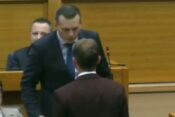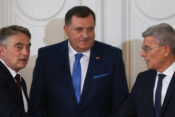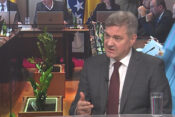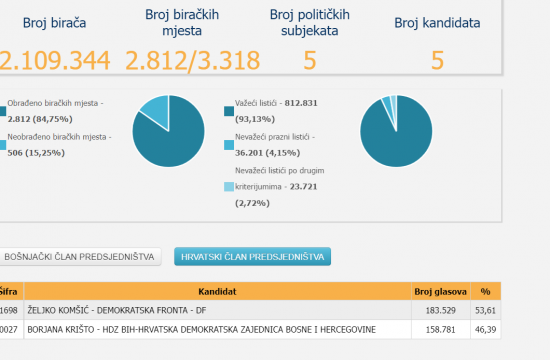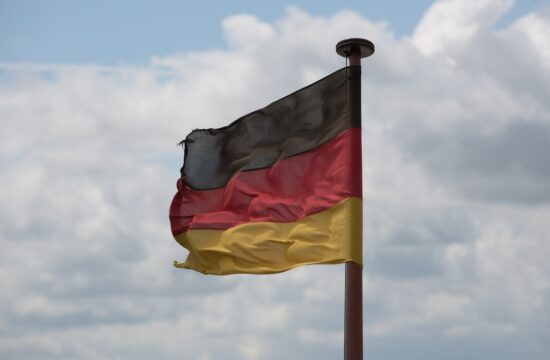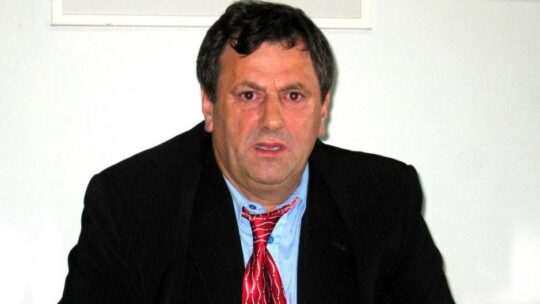
The ‘Reform Programme’ which Bosnia sent to NATO does not predict membership in the alliance and can not be used for making such a decision, one of the conclusions the parliament of Bosnia's Serb-majority region adopted Monday evening after a heated debate during which opposition lawmakers left the room.
Of the 83 lawmakers in the National Assembly of Republika Srpska (RS), one of Bosnia’s two semi-autonomous entities, 55 voted on whether to adopt the conclusions of the special session on the Reform Programme. Lawmakers from two of the strongest RS opposition parties, the Serb Democratic Party (SDS) and the Party of Democratic Progress (PDP), left the room before the vote after RS Interior Minister Dragan Lukac slapped PDP’s Drasko Stanivukovic.
In the end, 52 lawmakers voted in favour and three against adoption.
The incident took place during a heated debate on whether the Reform Programme implies that Bosnia will join NATO or not.
NATO remains unpopular with Serbs in both Serbia and in Bosnia's Serb-majority semi-autonomous entity of Republika Srpska (RS) since the alliance launched airstrikes against the Bosnian Serbs during the 1992-95 Bosnian war and against the Serbian military in 1999 during the conflict between Belgrade and ethnic Albanians in Kosovo.
According to earlier state Presidency decisions, Bosnia was supposed to send the Annual National Programme (ANP) to NATO, which would activate the country’s Membership Action Plan (MAP).
Bosnian Serb Presidency Member and RS ruling party leader Milorad Dodik, however, did not want Bosnia to make any further step toward membership with the alliance. The RS National Assembly had in 2017 adopted a Resolution on Military Neutrality, in line with neighbouring Serbia.
The other two state Presidency members, Bosniak Sefik Dzaferovic and Bosnian Croat Zeljko Komsic, insisted on sending the document and refused to vote for a candidate of Dodik’s Alliance of Independent Social Democrats (SNSD) to serve as the new Council of Ministers Chairman until it is sent.
This means that Bosnia did not have a new government formed for more than a year after the October 2018 election.
The political crisis only ended when the Presidency in November agreed that Bosnia will instead send the ‘Reform Programme’ to NATO.
An hour after Bosnia’s new ministers were sworn in on Monday, the document was sent to the alliance.
The opposition in the RS argued that what Bosnia sent is nothing other than the ANP, accusing Dodik and the SNSD of betraying Serb interests and pushing the country into NATO.
“We are leaving the session, as we do not support the path toward NATO,” said Miladin Stanic, from the SDS, adding that his party will never support the document Dodik presented at the session, claiming it was not the same as original that was sent to the alliance.
According to the RS National Assembly, the ‘Reform Programme of Bosnia and Herzegovina’ is in no way the same as the ‘Annual National Programme’ (ANP), as it does not have the same name and can thus not be used as basis for activating any processes except for cooperation and partnership with NATO. Any other interpretation and treatment of the document will be rejected, it said.
The Reform Programme also does not predict a decision on the country’s membership in NATO and thus discontinues the continuity of Bosnia’s efforts toward full membership in the alliance, the conclusions said, adding that the document is in line with the RS Resolution on Military Neutrality.

